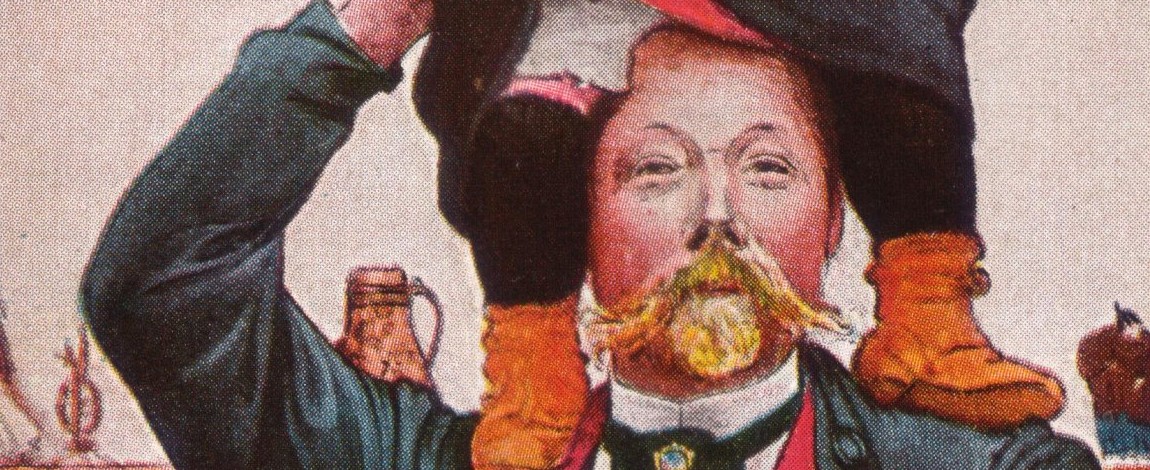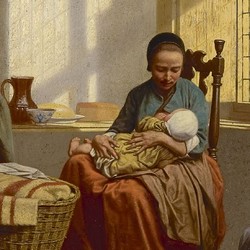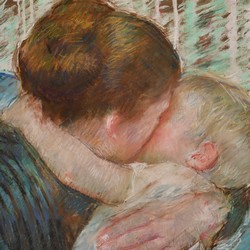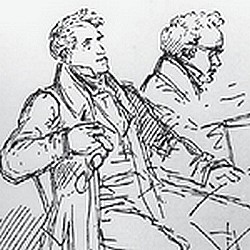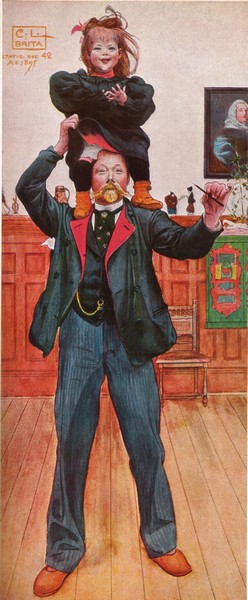
In mid-February 1877 Johannes Brahms received good news through friend and publisher Karl Simrock: the third (or fifth, according to different sources) child of Clara and Julius Stockhausen was born. A few days later, Julius himself wrote him to tell him that they have named the child Johannes, and to ask if he would be his godfather. Brahms accepted with pleasure; he loved children and had been good friends with Stockhausen since many years ago. He declined, however, to attend the baptism, scheduled for 2 April, Easter Monday; maybe because travelling from Vienna to Berlin was too complicated. I would say that the family wasn't Catholic (two months between birth and baptism was unusual in those times), and I don't know the habits in this case, but I am surprised that a child could be baptized without the presence of his godparents.
The day scheduled for baptism (which was finally on Whitsun day), Stockhausen received a handwritten score from his friend, a song for the little Johannes, accompanied by a brief note. It wasn't the first time Brahms had written a song for a baby; in 1864 he composed Geistliches Wiegenlied for Johannes, the first child of Amalie and Joseph Joachim, and in 1867, Wiegenlied, for the little Hans, son of Bertha and Arthur Faber (how many baby boys were named Johannes after Brahms?). The thing is, and you'll realize as soon as you listen to it, is that you need much imagination to consider the young Stockhausen's song a cradle song, both for the music and the poem.
The note and the dedication in the score clarify, at least in part, why. In the note, in addition to sending out his best wishes, Brahms tells Stockhausen that the day of baptism he will be in an excellent mood and be able to forgive him for a little joke because "I can find no lullaby for small children, and no melody to one for bigger children". And he adds, "You see that even your music keeps procreating!". The dedication said: "Lullaby for the small and the bigger, freely from H. H. and Jul. St.". The last initials correspond to Julius Stockhausen, and the first to Heinrich Heine. Because it turns out that Stockhausen, a great baritone and a respected and admired pedagogue and director, had also made some incursions into composition. In 1871, he had published a collection of four songs dedicated to Brahms, the third of which was Es liebt sich so lieblich im Lenze [Love is so lovely in spring!], and Brahms was inspired by this composition to return the dedication to his friend and give a gift to his son.
Thus, Brahms wrote Es liebt sich so lieblich im Lenze, his first Lied after Heine's poem, a poem he had only indirectly chosen. It does not belong to the Buch der Lieder, like the songs we're listening lately, but to the next collection, published in 1844, Neue Gedichte. The poem, Frühling, is the No. 13 from Romanzen, the second part of the poem. The four stanzas tell us of a shepherdess sitting by the river in spring; she weaves crowns of flowers and dreams of the man that would get them. Then a horseman rides along the river, greets her cheerfully and, alas!, goes right. With Heine's characteristic irony, the poem ends with the verse that has been repeated during the poem and both Stockhausen and Brahms used as their title.
The melody of the first two stanzas could be a cradle song; that of the other two, not. But I like Brahms's good mood, his warm-hearted relationship with his friends, and of course, the song, which is as lieblich as the title says. That's why I want to dedicate it to Eva, who arrived at the life of some friends not long ago, to welcome her and wish her the best. It's very likely that the girl becomes a Wagnerian because these things pass down from parents to children, but I hope her diet would be variated (as her fathers' diet) and one day she'll enjoy with Brahms. Welcome, sweetie!
The performers of our version are Andreas Schmidt and Helmut Deutsch, given that there are a couple of weeks left before summer arrives, think of what Brahms and Heine say, love is so lovely in spring!
Die Wellen blinken und fließen dahin—
Es liebt sich so lieblich im Lenze!
Am Flusse sitzet die Schäferin
Und windet die zärtlichsten Kränze.
Das knospet und quillt und duftet und blüht—
Es liebt sich so lieblich im Lenze!
Die Schäferin seufzt aus tiefer Brust:
„Wem geb ich meine Kränze?“
Ein Reiter reitet den Fluß entlang;
Er grüßet so blühenden Mutes!
Die Schäferin schaut ihm nach so bang,
Fern flattert die Feder des Hutes.
Sie weint und wirft in den gleitenden Fluß
Die schönen Blumenkränze.
Die Nachtigall singt von Lieb und Kuß—
Es liebt sich so lieblich im Lenze!
The waves flash and flow in;
Love is so lovely in Spring!
By the river the shepherdess sits
And weaves delicate crowns of wreaths.
The budding, the streaming, the wafting, and blossoming -
Love is so lovely in spring!
The shepherdess sighs from deep in her bosom:
"To whom shall I give my wreaths?"
A horseman rides along the river:
he greets her with radiant cheer,
the shepherdess gazes at him shyly,
and far in the distance the feather flutters in his cap.
She weeps and throws into the gliding river
those lovely wreaths of flowers.
The nightingale sings of love and kisses;
Love is so lovely in the spring!
(translation by Emily Ezust)


